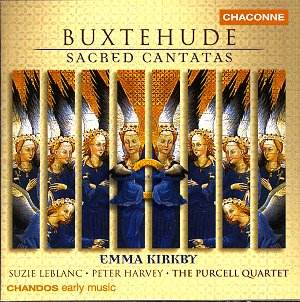Dietrich Buxtehude was a Danish composer who
was later naturalized German. He spent most of his life in Lübeck,
where he worked as organist at St. Mary's church. Well-known and
respected during his lifetime, he was what might be called, today,
a composer's composer.
Buxtehude wrote a wide variety of music - from beautiful works
for harpsichord, to masterpieces for organ, by way of vocal music.
He also started a series of concerts separate from church services
called Abendmusik (Evening music), to provide musical entertainment
for the town's bourgeoisie.
This magnificent recording features a selection of his sacred
cantatas, performed with very small-scale forces: the Purcell
Quartet is made up of a violin, a viola, a violone and a continuo
organ (plus an additional violin for one of the pieces). This
almost ascetic group lets all the focus be on the vocal soloists.
And what soloists! Emma Kirkby is excellent as always, Suzie Le
Blanc is riveting, and Peter Harvey is a bit restrained but also
very moving.
This recording is much more than the sum of its parts. Not only
are the musicians exemplary, and the soloists top-notch, but they
meld in such perfection that almost every note on this disc is
pure joy. The recording has just the right amount of reverberation
from the setting in which it was made, and all the instruments
fill the soundscape in an ideal fashion. This is indeed a disc
to appreciate through headphones, if possible.
The cantatas here are relatively short works, from seven to just
over twelve minutes long. Sung to Latin texts for some and German
for others, they often alternate voice and instruments in a solo-tutti
form. There are no musical pyrotechnics here, just beautiful melodies
and lush harmonies. Add to that the perfect combination of Kirby
and Le Blanc's voices, in the cantatas where they sing together,
and the ideal sound of Peter Harvey singing along with them.
A wonderful interlude is the performance by Robert Woolley of
the Fugue BuxWV 174 in C major for organ. Buxtehude's organ music
is generally performed on large church organs, and this interpretation
on a small continuo organ lets the listener discover the subtle
counterpoint of the fugue in a much different setting, one where
the individual voices come through more clearly than in the imposing
resonance of a great organ.
This is a beautiful recording, full of joy and energy, with some
magnificent music-making and excellent singing. The entire disc
as a pleasure, and the ideal balance between the musicians and
instrumentalists lets this music come alive.
Kirk McElhearn


![]() Emma Kirkby, soprano
Emma Kirkby, soprano![]() CHANDOS CHACONNE CHAN 0691
[75:33]
CHANDOS CHACONNE CHAN 0691
[75:33]